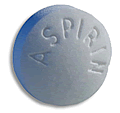HIV
Positive People Could Benefit from Aspirin to Reduce Cardiovascular
Risk
 |
 |
 |
 |
 |
 |
 |
| SUMMARY:
Nearly
one-third of people with HIV who are at increased risk
for cardiovascular disease may benefit from taking daily
aspirin -- a measure intended to reduce blood coagulation
(clotting) and inflammation -- but few currently do
so, according to a letter in the August 15, 2010 Journal
of Acquired Immune Deficiency Syndromes.
|
|
 |
 |
 |
 |
 |
 |
 |
By
Liz Highleyman
 Studies
have shown that people with HIV
have a higher risk of cardiovascular
disease, but it is not yet clear whether this is due to HIV
infection itself, chronic immune activation and inflammation,
antiretroviral drugs,
traditional risk factors, or some combination
thereof. A growing body of evidence indicates that chronic
immune activation, persistent inflammation, coagulation, and endothelial
(blood vessel lining) dysfunction contribute to cardiovascular
disease in HIV positive (as they do in uninfected people as well).
Studies
have shown that people with HIV
have a higher risk of cardiovascular
disease, but it is not yet clear whether this is due to HIV
infection itself, chronic immune activation and inflammation,
antiretroviral drugs,
traditional risk factors, or some combination
thereof. A growing body of evidence indicates that chronic
immune activation, persistent inflammation, coagulation, and endothelial
(blood vessel lining) dysfunction contribute to cardiovascular
disease in HIV positive (as they do in uninfected people as well).
Carlos Tornero and colleagues from Hospital Gandia in Spain assessed
how many HIV positive patients at their clinic would qualify to
receive aspirin for cardiovascular risk reduction according to
recent guidelines. Studies have shown that daily aspirin reduces
the likelihood of heart attacks, but long-term use can damage
the gastrointestinal lining and cause bleeding.
Based on a review of medical literature since 2002, the U.S. Preventive
Services Task Force recommended
in 2009 that men age 45-79 should use aspirin "when the
potential benefit of a reduction in myocardial infarctions outweighs
the potential harm of an increase in gastrointestinal hemorrhage,"
and women age 55-79 should do so "when the potential benefit
of a reduction in ischemic strokes outweighs the potential harm
of an increase in gastrointestinal hemorrhage."
Tornero's team reviewed medical records from 120 HIV patients,
looking at demographic factors such as sex and age and other traditional
cardiovascular risk factors including smoking, abnormal blood
lipid levels, diabetes, and high blood pressure.
Results
 |
Based
on the guidelines, 37 patients, or about 31%, could potentially
benefit from preventive aspirin. |
 |
This
percentage increased to 40% when looking only at men. |
 |
The
proportion was projected to rise by 15% over the next 5 years
as the population ages. |
 |
However,
only 2 people were currently taking daily aspirin -- about
2% of the total study population, or about 5% of those predicted
to benefit. |
"Application
of the recently published recommendations on the use of aspirin
in HIV-infected patients could help reduce the rise in cardiovascular
events described in some studies," the study authors concluded.
"[I]n the management of cardiovascular risk among HIV-infected
patients, it is therefore necessary to also consider aspirin as
primary prevention treatment."
8/31/10
Reference
C
Tornero, A Ventura, and M Mafe. Aspirin is indicated for primary
prevention of cardiovascular events in HIV-infected patients.
Journal of Acquired Immune Deficiency Syndromes 54(5):
560. August 15, 2010.
